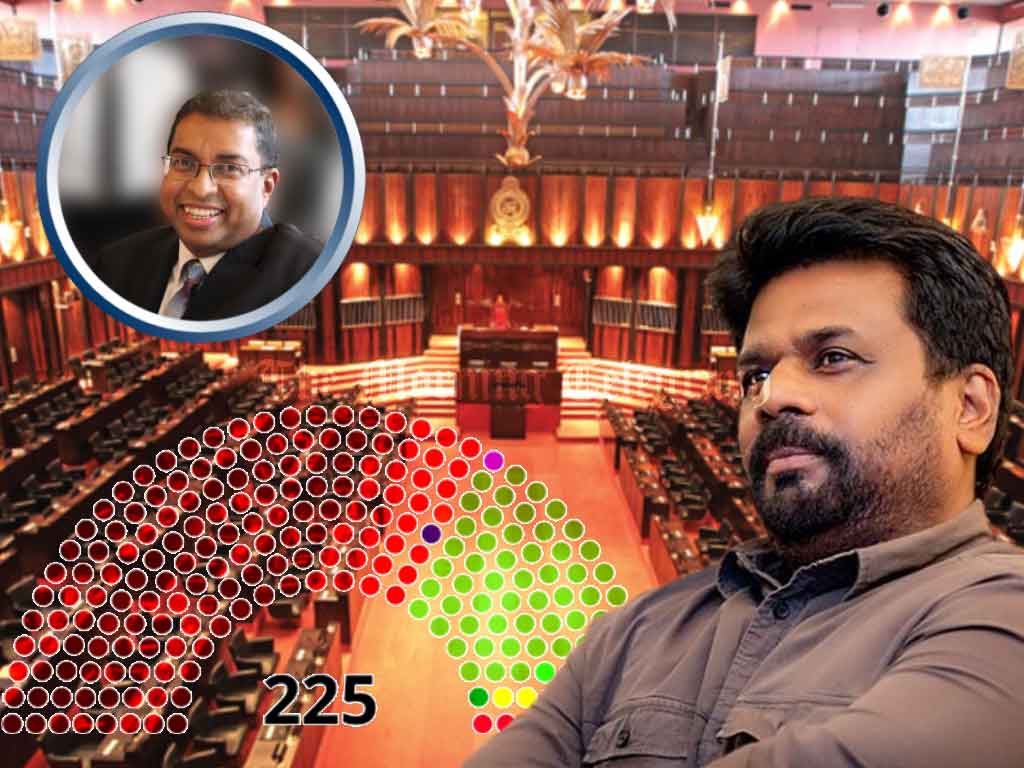
By Saliya Peiris, Former BASL President
As the results of Sri Lanka’s 2024 general election continue to emerge, it has become evident that the National People’s Power (NPP) is on the cusp of securing a two-thirds majority in Parliament. This development marks a significant milestone for the NPP, which stands poised to either secure the two-thirds majority or come close to it, a feat that has been previously elusive for other parties under Sri Lanka’s Proportional Representation system.
Historically, the two-thirds majority has remained a challenging goal for political parties. In the 2010 parliamentary election, the People’s Alliance and in 2020, the Sri Lanka Podujana Peramuna (SLPP) came close but ultimately needed to rely on the support of opposition members to reach the coveted two-thirds threshold. This new potential outcome for the NPP is unprecedented, as it would be the first time in Sri Lanka’s political history under this system that a single party could independently achieve such an overwhelming majority in Parliament.
This victory has been compared to the 1994 Presidential election when Chandrika Kumaratunga won the presidency, a turning point in Sri Lanka’s political landscape. Similar to Kumaratunge’s leadership, this election result signals the potential for a new era in Sri Lankan politics.
The NPP’s impressive gains in Sri Lanka’s Northern and Eastern provinces are particularly noteworthy. These regions, which have historically been marginalized, now have the opportunity to play a pivotal role in national politics. With these significant electoral wins, the NPP now has the potential to unite the country’s diverse ethnic and religious communities, offering a chance for national reconciliation that has been a long-standing issue since the end of the civil war. The NPP’s broadening support across different demographic groups is crucial for building a unified Sri Lankan identity.
One of the most significant promises that could be realized in the aftermath of a two-thirds majority is the abolition of the Executive Presidency, which has been a focal point of the NPP’s platform. The NPP’s ability to quickly pass this reform would be a victory for democratic governance, as it would limit the concentrated power of the executive and shift to a more balanced political structure, enhancing parliamentary democracy.
The overwhelming support for the NPP also indicates widespread public approval for the political changes initiated by President Anura Kumara Dissanayake. His leadership has been marked by a break from traditional political practices, focusing on transparency, accountability, and political reform. The NPP’s victory highlights the electorate’s endorsement of this new political culture, which prioritizes public welfare and good governance.
However, the NPP must be mindful of the challenges and pitfalls associated with wielding such vast power. The President himself has cautioned that previous governments, with similar mandates, used their two-thirds majorities to pass laws that infringed upon democratic rights. The NPP must avoid succumbing to the temptation of using its newfound power to enact legislation that undermines freedoms and the rule of law.
Moreover, the new administration will face immense pressure to meet the high expectations of the electorate. Citizens are expecting rapid progress in various critical areas: economic recovery, tackling inflation, addressing corruption, improving social services, enacting constitutional reforms, and fostering national reconciliation. The NPP leadership will need to balance these urgent demands while staying true to the principles that have defined the party’s platform.
The leadership’s challenge will also lie in managing a relatively new and inexperienced group of MPs and ministers. Ensuring that these individuals adhere to the NPP’s principles of integrity and public service will be crucial. The party’s leadership must remain vigilant to avoid any missteps that could betray the trust placed in them by voters. Lessons from previous governments, which were elected with large majorities but ultimately faltered, should serve as a reminder of the pitfalls that await those in power.
As Sri Lanka stands at a crossroads, there is hope that the NPP’s leadership can rise to the occasion and usher in a new era of reform and prosperity. The country can ill afford another failed government. For the NPP, this is a critical moment to demonstrate its commitment to meaningful change and to fulfill the promises made to the people.
In conclusion, while the NPP’s victory is a historic moment for Sri Lankan politics, it also comes with significant responsibilities. It is now up to the new government to navigate the complexities of power with care, ensuring that it fulfills the hopes and expectations of the electorate without falling into the same traps that have beset past administrations. The NPP’s leadership must remember that its success will not only be measured by the size of its mandate but also by its ability to deliver on its promises and uphold democratic values.




